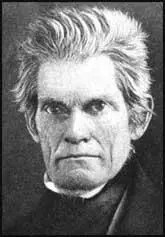John Calhoun

John Calhoun was born in Abbeville, South Carolina, on 18th March, 1782. Educated at Yale College and the Litchfield Law School, he was admitted to the bar but after his marriage to the rich heiress, Floride Bonneau, he concentrated on politics.
Calhoun was elected to South Carolina's state legislature in 1808 and three years later entered the House of Representatives. As chairman of the foreign relations committee, he introduced the declaration of war against Britain in 1812. During this period he emerged as one of the leaders of the Republican Party.
In 1817 Calhoun was appointed secretary of war, a post he held for eight years. In 1824 Calhoun was elected vice president under John Quincy Adams. Four years later he held the same post under Andrew Jackson but resigned over Jackson's unwillingness to allow South Carolina to nullify the protective tariff introduced in 1828.
In the summer of 1831 Calhoun advocated his belief in nullification. In his Address to the people of South Carolinahe argued that each state was sovereign and the United States Constitution was a compact among sovereign states. Therefore, according to Calhoun, any one state, not the Supreme Court, could declare an act of Congress unconstitutional.
Calhoun upheld the right of people to own slaves and presented the South's point of view in Senate debates on this issue. In 1844, as secretary of war, he signed a treaty annexing Texas. However, in 1846 strenuously opposed the Mexican War.
In 1848 Zachary Taylor of the Whig Party was elected president. The great issue before the nation was the problem of slavery in the land taken from Mexico. New Mexico and California were being ruled by military governors but Taylor favoured them becoming part of the United States. This became more complicated after the people of California and New Mexico approved constitutions prohibiting slavery. Calhoun led the pro-slavery faction in Congress that opposed the admission of California and New Mexico as free states. John Calhoun died on 31st March, 1850.
Primary Sources
(1) John Caldwell Calhoun, speech in the Senate (4th March, 1850)
How can the Union be saved? There is but one way by which it can with any certainty; and that is, by a full and final settlement, on the principle of justice of all the questions at issue between the two sections. But can this be done? Yes, easily; not by the weaker party, for it can of itself do nothing - not even protect itself - but by the stronger. The North has only to will it to accomplish it - to do justice by conceding to the South an equal right in the acquired territory, and to do her duty by causing the stipulations relative to fugitive slaves to be faithfully fulfilled and to cease the agitation of the slave question.
